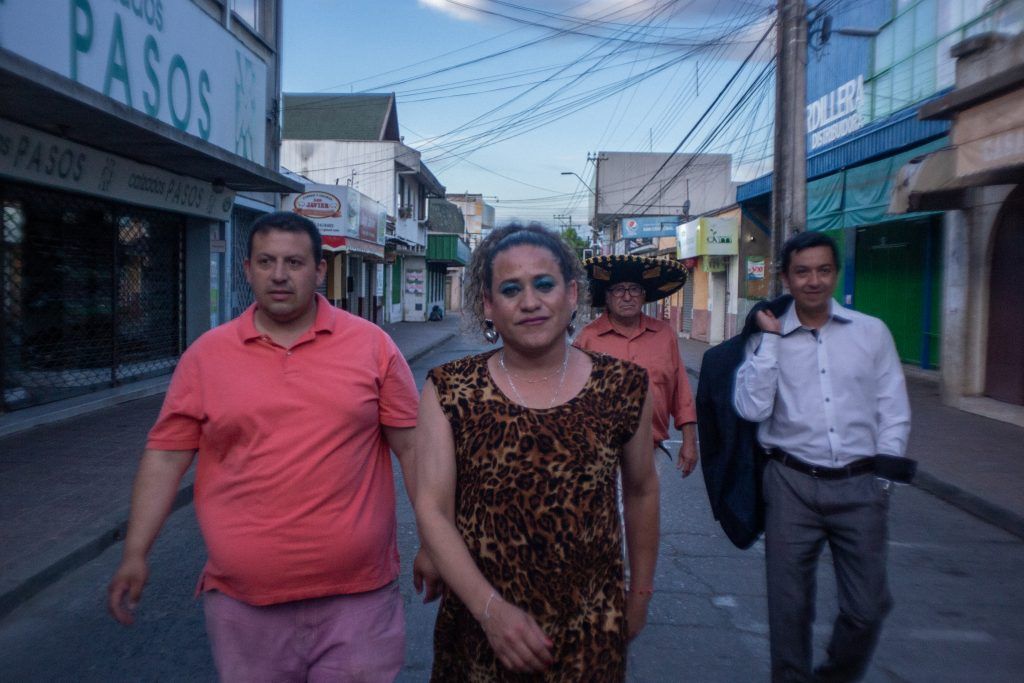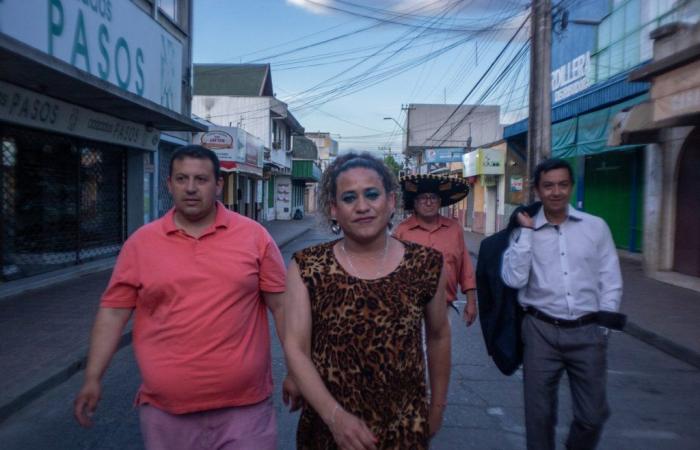The film’s argument revolves around four characters that form an activist cell to demand the public recognition of the sausage of San Carlos, with a story is built on an identity conflict rooted in the Ñuble region.
In San Carlos, Ñuble Regionsausages are such a daily element, that they seem to have rooted in collective consciousness as illustrious daughters. They are, as described by the filmmaker Tomás Alzamora (35) a CNN Chilepart of the “architectural flora” of the commune.
“They have always been present at our tables. In our family meetings; baptisms, first communions, football matches. It gives the impression that even in architecture, in the flora of the town. You caminai Towards the square and there are sausages hanging in all butchers, ”he says.
Therefore, as a good Sancarlino, the director of Denomination of origin He did not need to go too far to find the story that would follow The white lyingits prima opera, released in 2017 and starring Catalina Saavedra and Rodrigo Salinas. He did not imagine, however, that it would be the administrative decision after a contest that would end up shaping him.
The scenario dates back to 2018, during the Longaniza party in Chillánwhen a jury composed of chefs awarded the Prize for the Best Longaniza in Chile to the Center for Education and Labor (CET) of San Carlos, where people deprived of liberty made the product. However, that same day, the organization of the event requested that recognition be returned.
“They receive the prize. Photo, photo, photo. National Pride, (they appear on the) Twitter of Gendarmerie of Chile. And at 7 in the afternoon, the organization calls us and says, You have to return the award”, Says Alzamora.“ When I find out the news and I said, You have to make a movie of this. And there all this fiction is created and the MSPLSC is created, which is the social movement for the longaniza of San Carlos ”.
The Chilean filmmaker did not know about the event at the time. Years later, while preparing a teaser To apply for funds, one of the interviewed people mentioned what happened and showed episode records. From there, he decided to incorporate the real case as a trigger for the story in the film.
Since then, the project was taking shape with non -professional actors, residents of the same town and limited resources. The director had already filmed his prima opera in the area (The white lying2016), which facilitated local adhesion. “There were more than 200 people who arrived at the casting for three days. I had not told them even the story (…) Then I told them: Well, you will deal with the history of sausage. (And responded) ‘Ya, come on, come on’”.
The film’s argument revolves around four characters that form an activist cell to demand the public recognition of the sausage of San Carlos, with a story is built on a identity conflict rooted in the Ñuble region. And, he explains, although a good part of the production of sausages comes from San Carlos, the public and commercial denomination has historically favored Chillán.
This tension becomes a metaphor for the problems of representation, centralism and inequality that he himself has lived as a creator. “All at some point we are or continue to be the MSPLSC in different ways,” he says, referring to the fictional Social movement for the sausage of San Carlos that leads the plot.
For Alzamora, part of the motivation behind the project is to respond to an industry that, in his opinion, has tended to look more towards foreign festivals than towards their own territories. And although it values the Chilean cinema technical advances (of “an impressive quality”), considers that a more direct connection with everyday stories is missing. “We are thinking sometimes very sophisticated, which connect very well with Europe (…) but Missing to get intopa’ There, in the populations, in the countryside, Pata Pelada, in the mud”.
-
Credits: Denomination of origin
From its perspective, this phenomenon responds to a broader problem that not only affects cinema, but also Chilean society in general. “I think the aspirational does not do us so well”he said. In his opinion, that same impulse leads to undervalue cultural traditions themselves. “We are always looking mediumo P ‘ftrue; And that Europe is Bacán and that the United States is Bacán”And within that same reflection, assumes that Denomination of origin He highlighted the prejudices even before being seen: “Pine empanada is seen as something Chabacano. And I think a lot of people before watching the movie said: ‘How ordinary … The Longa movie’”.
Faced with that panorama, its commitment has been just the opposite: to claim the local, work with communities, rescue real characters, and demonstrate that significant stories can arise from the most everyday. In his words: “It would be nice (…) that young filmmakes see that They can make the film with the Lucho, with the Byron, with the Luchita, with the gas guatón. With those who are here”.
It also includes the language of social protest and cultural precariousness: bureaucratic processes, competitive funds, municipal management. “As artists, as filmmakers, as culture workers, we face all the time. To do The white lyingwe had to go to the municipal council to Mendive some pesos. It is a world too precarious, we have to look for auspices and organizing raffles to make films. ”
In Chilean cinema, rurality has often been synonymous with tragedy, poverty and violence. But Alzamora decided to tell another story. “I am not a dramatic person. I’m laughing all the time,” he admits. “AND This movie is born from the Guata. There was no conscious decision to make a comedy to sell more. It is simply how we had a good time. ”

Credits: Denomination of origin
There are no professional actors, nor manufactured sets: the characters are real people, and many of the documentary scenes were captured as they happened. Hence The term “mockumentary” seems insufficient. “This film that travels between the documentary and fiction. If it had been a false documentary, we would have recreated those scenes. But all that is real, documentary, pure and hard,” he clarifies.
A playful surprise at the premiere
Marketing strategy after Denomination of originfor its part, it has also broken schemes. Without external agencies or high budgets, the team opted for a creative and deeply local campaign; with elements that range from fictitious marches along the road to viral videos and choripanes distributed in the first projections.
Everything, with a playful tone that, according to the words of its own director, seeks Keep the spirit of the film alive.
“We continue in the same world, playing with that. And we have enjoyed it and we have laughed a lot,” he says. “As or To do an event and not distribute choripanes?”, Lets out more as a statement than a question in itself.“ Maybe it attracts attention, but for me, it is logical. It goes hand in hand with that territory and ideas, and if there is a large event, There must be choripanes. If it is our pride, Cachái? ”.








